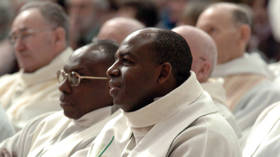Pope defrocks priest accused of genocide

Pope Francis has expelled a Rwandan-born priest who had been working for nearly three decades as a clergyman in northern France, where he fled following the genocide in his homeland. The order instructs the priest to “avoid places where his previous status is known.”
The Pontiff’s decision to remove Wenceslas Munyeshyaka from the clerical state was dated March 23, and was announced on Monday. It is based on the priest’s admission that he fathered a child in 2010, Catholic outlet La Croix International reported on Thursday.
Munyeshyaka “automatically loses all rights” associated with his ordination and is “excluded from the exercise of the sacred ministry,” according to a statement circulating online signed by the bishop of the diocese of Evreux.
Bishop Christian Nourrichard said the priest’s removal is not “subject to any appeal” and begins with “immediate effect.”
Munyeshyaka, who was the head of a parish in the Evreux diocese, was suspended by the bishop in December 2021 after he reportedly admitted being the father of a 10-year-old boy “from an affair he had in Gisors.”
Ordained a priest in 1992, Munyeshyaka was accused in 1995 of participating in the genocide against the Tutsis in Rwanda, including the rape of women and executions at his church in Kigali. According to the United Nations, an estimated 800,000 people were massacred in the genocide, which lasted 100 days between April and July 1994.
French courts cleared Munyeshyaka of criminal charges in the 20-year case in 2015 due to a lack of substantial evidence.
Munyeshyaka’s dismissal “is not related” to the genocide allegations, and is based on the conclusion of an investigation relating to his suspension in 2021, the dioceses clarified, as reported by La Croix.













